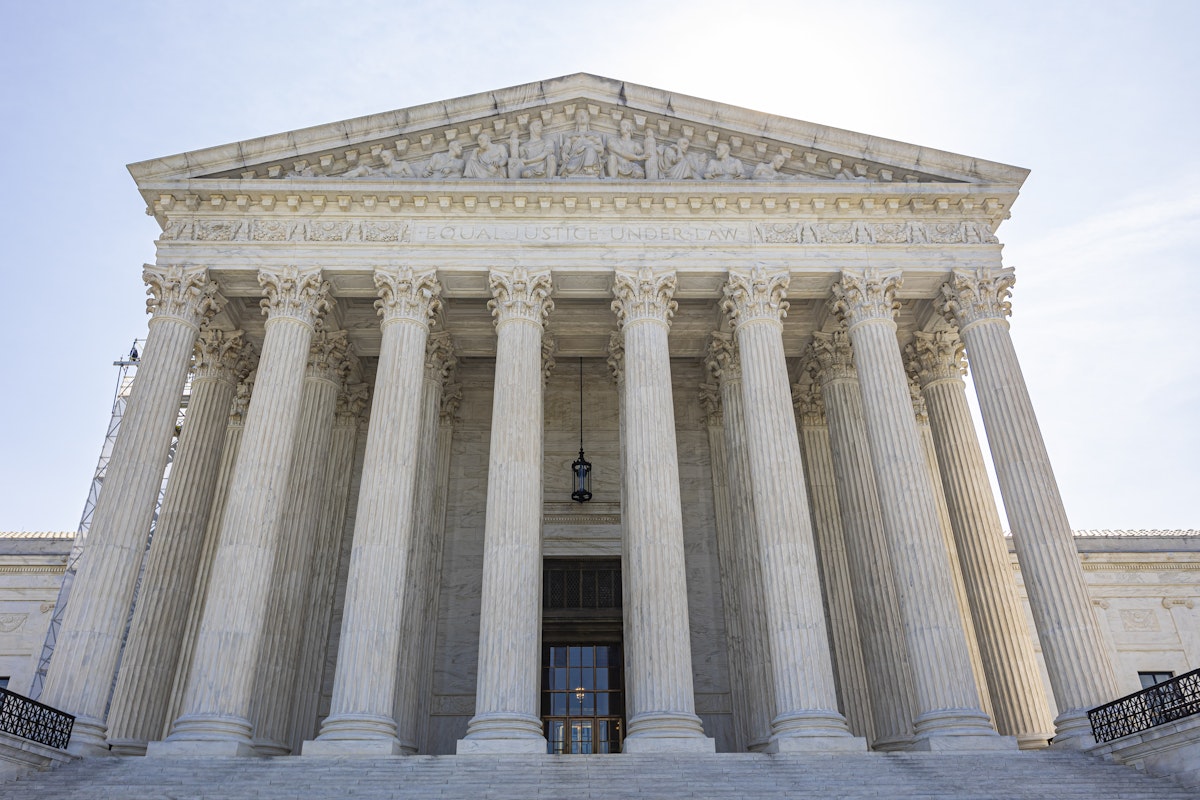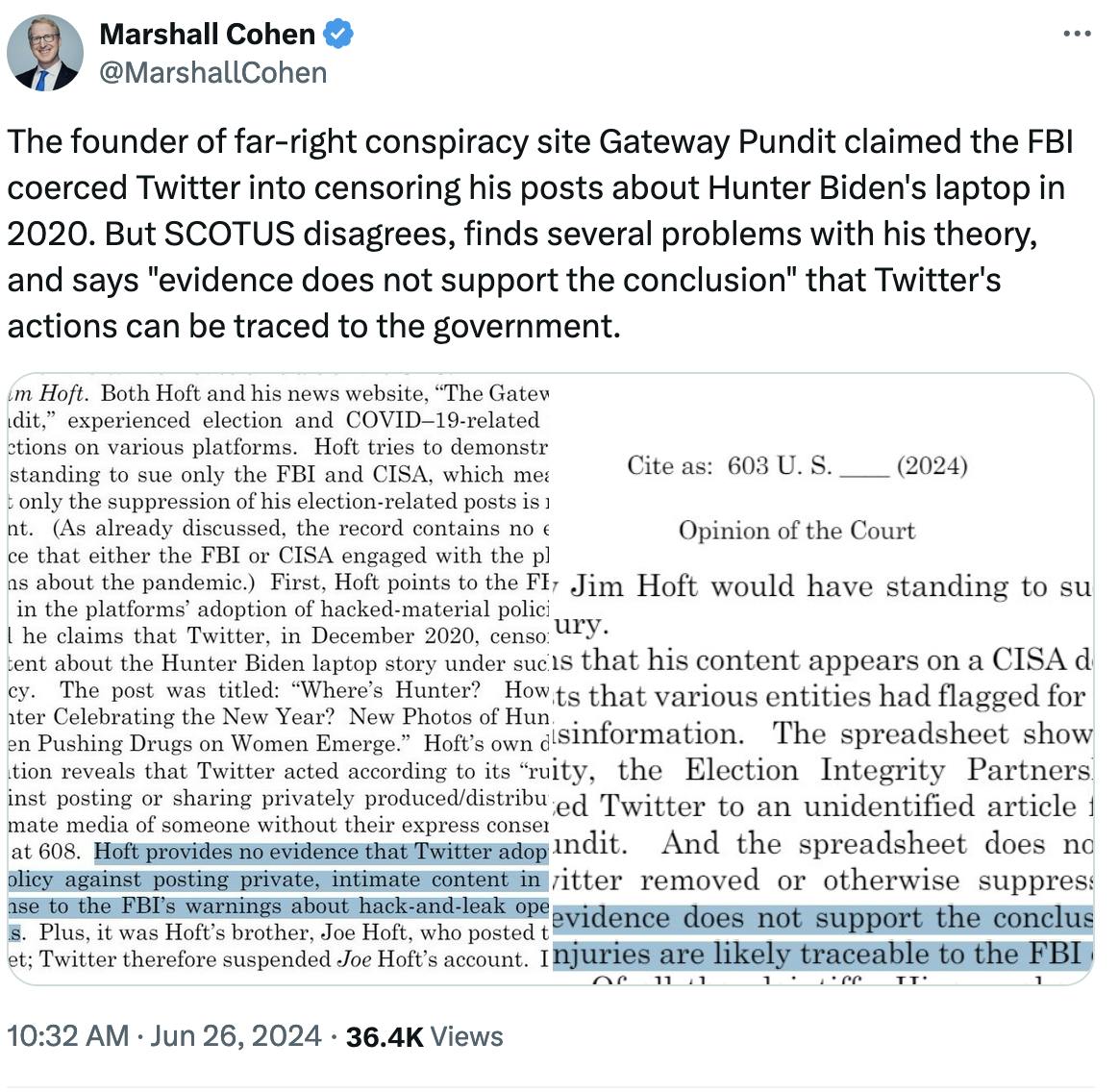Supreme Court Nukes Hunter Biden Laptop Conspiracy in Brutal Ruling
The Supreme Court issued a surprising decision on Wednesday, finding that complaints that the Biden administration had forced censorship on conservative social media users were unfounded. In its 6–3 decision, the Supreme Court laid a death blow in particular to the conspiracy theory that the FBI forced social media companies to suppress stories about Hunter Biden’s laptop.One of the main conspiracy theories that has kept conservatives in a chokehold for the past three years is that the FBI forced social media companies to remove content discussing Hunter Biden’s laptop to protect the Bidens. In reality, social media companies cracked down on the dissemination of photos purporting to have come from Biden’s laptop in accordance with their boilerplate hacked-materials policies, which enforce against the dissemination of content obtained through illegal means, such as revenge porn. That enforcement resulted in a removal of posts discussing Biden’s laptop that included those photos, but discussions of the laptop on their own weren’t restricted.One plaintiff in the Supreme Court case was Jim Hoft, founder of the failing far-right conspiracy website Gateway Pundit. Hoft elevated the FBI interference conspiracy and claimed moderation efforts taken by Twitter caused him harm. Hoft embedded Twitter posts made by his brother, Joe Hoft, sharing photos claiming to be from Biden’s laptop. Twitter suspended Joe Hoft’s account, which resulted in the posts embedded on Gateway Pundit turning up as dead links. Hoft was likely trying to pull a sneaky workaround to avoid licensing and verifying the images himself, instead sourcing to content published on Twitter, and the effort failed. Hoft claimed the FBI interfered to remove the photos and that doing so caused him harm.The Supreme Court meticulously ripped these claims to shreds, hilariously sourcing Hoft’s own claims that the crackdown came from Twitter’s existing hacked materials policy.“Hoft points to the FBI’s role in the platforms’ adoption of hacked-material policies. And he claims that Twitter, in December 2020, censored content about the Hunter Biden laptop story under such a policy,” the Supreme Court opinion reads. “Hoft’s own declaration reveals that Twitter acted according to its ‘rules against posting or sharing privately produced/distributed intimate media of someone without their express consent.’”Further twisting the knife in the FBI conspiracy, the decision notes, “Hoft provides no evidence that Twitter adopted a policy against posting private, intimate content in response to the FBI’s warnings about hack-and-leak operations.”Twitter nuked posts from The New York Post and other conservative accounts that circulated Hunter Biden’s hacked photos. The conservative blowback was intense, yet the Federal Election Commission ruled that Twitter acted lawfully in restricting the circulation of Hunter Biden’s hacked photos. Soon after, Twitter decided to change its policy to allow for the circulation of hacked materials, so long as the poster isn’t the hacker or someone working “in concert” with the hacker.

The Supreme Court issued a surprising decision on Wednesday, finding that complaints that the Biden administration had forced censorship on conservative social media users were unfounded. In its 6–3 decision, the Supreme Court laid a death blow in particular to the conspiracy theory that the FBI forced social media companies to suppress stories about Hunter Biden’s laptop.
One of the main conspiracy theories that has kept conservatives in a chokehold for the past three years is that the FBI forced social media companies to remove content discussing Hunter Biden’s laptop to protect the Bidens. In reality, social media companies cracked down on the dissemination of photos purporting to have come from Biden’s laptop in accordance with their boilerplate hacked-materials policies, which enforce against the dissemination of content obtained through illegal means, such as revenge porn. That enforcement resulted in a removal of posts discussing Biden’s laptop that included those photos, but discussions of the laptop on their own weren’t restricted.
One plaintiff in the Supreme Court case was Jim Hoft, founder of the failing far-right conspiracy website Gateway Pundit. Hoft elevated the FBI interference conspiracy and claimed moderation efforts taken by Twitter caused him harm. Hoft embedded Twitter posts made by his brother, Joe Hoft, sharing photos claiming to be from Biden’s laptop. Twitter suspended Joe Hoft’s account, which resulted in the posts embedded on Gateway Pundit turning up as dead links. Hoft was likely trying to pull a sneaky workaround to avoid licensing and verifying the images himself, instead sourcing to content published on Twitter, and the effort failed. Hoft claimed the FBI interfered to remove the photos and that doing so caused him harm.
The Supreme Court meticulously ripped these claims to shreds, hilariously sourcing Hoft’s own claims that the crackdown came from Twitter’s existing hacked materials policy.
“Hoft points to the FBI’s role in the platforms’ adoption of hacked-material policies. And he claims that Twitter, in December 2020, censored content about the Hunter Biden laptop story under such a policy,” the Supreme Court opinion reads. “Hoft’s own declaration reveals that Twitter acted according to its ‘rules against posting or sharing privately produced/distributed intimate media of someone without their express consent.’”
Further twisting the knife in the FBI conspiracy, the decision notes, “Hoft provides no evidence that Twitter adopted a policy against posting private, intimate content in response to the FBI’s warnings about hack-and-leak operations.”
Twitter nuked posts from The New York Post and other conservative accounts that circulated Hunter Biden’s hacked photos. The conservative blowback was intense, yet the Federal Election Commission ruled that Twitter acted lawfully in restricting the circulation of Hunter Biden’s hacked photos. Soon after, Twitter decided to change its policy to allow for the circulation of hacked materials, so long as the poster isn’t the hacker or someone working “in concert” with the hacker.



